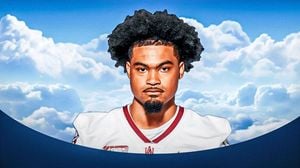British singer-songwriter Kate Nash has taken the music industry by storm, not just with her catchy tunes but also with her daring approach to funding her tour amid what she describes as a "crisis" for artists. Recently launching her "Butts 4 Tour Buses" campaign, Nash has turned to OnlyFans to help cover the rising costs of touring, making headlines for both her entrepreneurial spirit and her provocative marketing tactics.
On November 28, Nash was spotted protesting outside the offices of major industry players, Live Nation and Spotify, carrying the message of grassroots support and artist agency. With her cheeky flair, she showcased her "bum on the back of a fire truck," alluding to her campaign's creative approach of using her image to drive attention and funding for her tours. "You thought I was done with bum stunts? Well, I’m just getting started!" she proclaimed on her Instagram, highlighting her commitment to raise awareness about the immense struggles artists face today.
Nash's endeavor stems from the harsh financial realities of the music industry. She noted, "The industry is broken, and the music industry has failed artists, completely unsustainable. The cost of presenting live music has gone up by 30.3 percent over the past two years, and there were 125 venues closed last year alone in the UK.” These statistics paint a stark picture: with many artists grappling to make ends meet, Nash's protest shines light on artists' need for stronger support mechanisms.
At the heart of Nash's message is the need for the general public to recognize the struggle of artists. She expressed frustration at Live Nation's staggering profits, which amounted to £22.749 billion last year, and pointed out their stance against governmental recommendations to contribute £1 per ticket to support grassroots venues. "Live Nation is choosing profits over sustainability for the arts," she stated, underscoring the disparity between the industry's earnings and the financial plight faced by smaller acts.
Her only fans campaign, which offers subscriptions starting at $9.99, aims to not only fund her tours but to spark conversations about inequality and access within the music industry. To Nash, engaging with her audience through such unconventional means isn't just about fun; it’s about reclaiming agency. "Selling pictures of my bum gives me the financial capacity to reinvest back to my creative projects — the music industry doesn’t give me agency," she addressed skeptics of her methods.
Interestingly, Nash is not alone in this daring venture. Fellow singer Lily Allen recently ventured onto OnlyFans as well, aiming to promote her own creative outputs. Allen revealed she makes more from selling feet pics than from streaming her music on platforms like Spotify. "Imagine having millions of listeners and making more from OnlyFans!" Allen said on X, highlighting the financial disparity artists have become accustomed to.
Theirs is part of a growing trend where musicians are exploring alternative avenues to sustain their careers as traditional revenue streams dry up. Nash remarked, "The majority of musicians are struggling to sustain themselves. Touring can often lead to losses rather than profits, but these bills keep piling up with rising costs for travel, food, and accommodation. It's become unsustainable.”
Reflecting on the latest protests, Nash’s Instagram feed features commentary surrounding her experiences alongside images of her campaign, labeled #ButtsForTourBuses. Amidst her serious mission, she maintains the lighthearted nature of her promotion: "Let’s face it, I’ve got a great derriere and I’m glad it serves as part of the solution!"
Nash’s efforts resonate with many artists across the industry, especially those operating independently, like herself. The demands of maintaining viability within music are steep, and the barriers are especially high for working-class artists. She lamented, "The music industry has created a world that's exclusive to those with privilege — if you don’t have fame or some alternative means to earn money, you’re not getting through the door. Working-class artists are systematically shut out.”
While Nash’s protest has garnered considerable media attention, she insists it's not just about her. "I want to support artists who are really struggling right now. If behind closed doors industry executives are aware of this dire situation, they need to step up. Otherwise, we risk losing so many talented voices from the scene," she emphasized.
Support for Nash’s protest has surfaced from various corners of the industry. The grassroots movement Save Our Scene has backed her campaign wholeheartedly. Its founder voiced hopes for major players in the music industry to heed Nash's call and implement policies supporting struggling venues. “Every artist selling out arenas started from the grassroots. We need to protect the sources of creativity,” he stated.
Nash's lively protest underscored not just the grim reality of today’s music industry but also the potential for innovation and personal agency within it. By using humor, camaraderie, and cheeky visuals, Nash aims to create tangible change, arguing not just for her career, but for the future of all artists. "This is about agency, empowerment, and ensuring the industry transitions from purely profit-driven to sustainably supporting the artists it claims to care about. We can’t just keep pouring pennies when we see profits at the top. Artists deserve to thrive, not just survive!"
Her bold actions have sparked dialogues about agency, financial disparities, and the importance of the grassroots movement within entertainment. It demonstrates how artists like Nash are taking control of their narrative and seeking to transform the system to reflect their rightful place within the industry.
But the road forward remains fraught with challenges. Nash’s tenacity brings hope, but it also highlights the urgency with which the music industry must adapt or risk losing its heart—an array of vibrant voices and creative outputs yearning to be heard.



